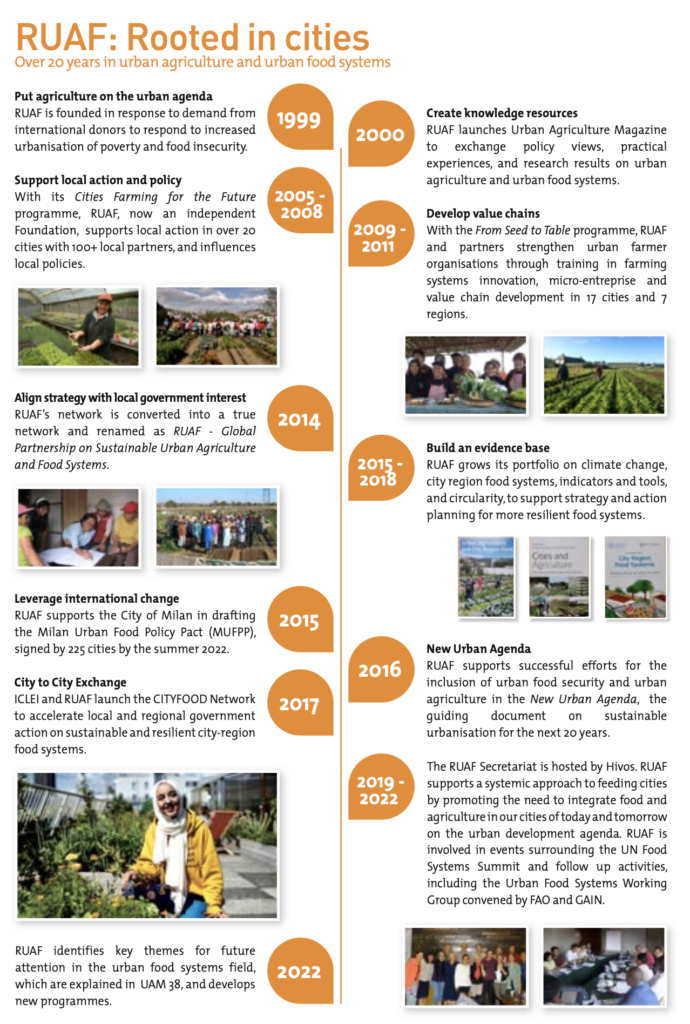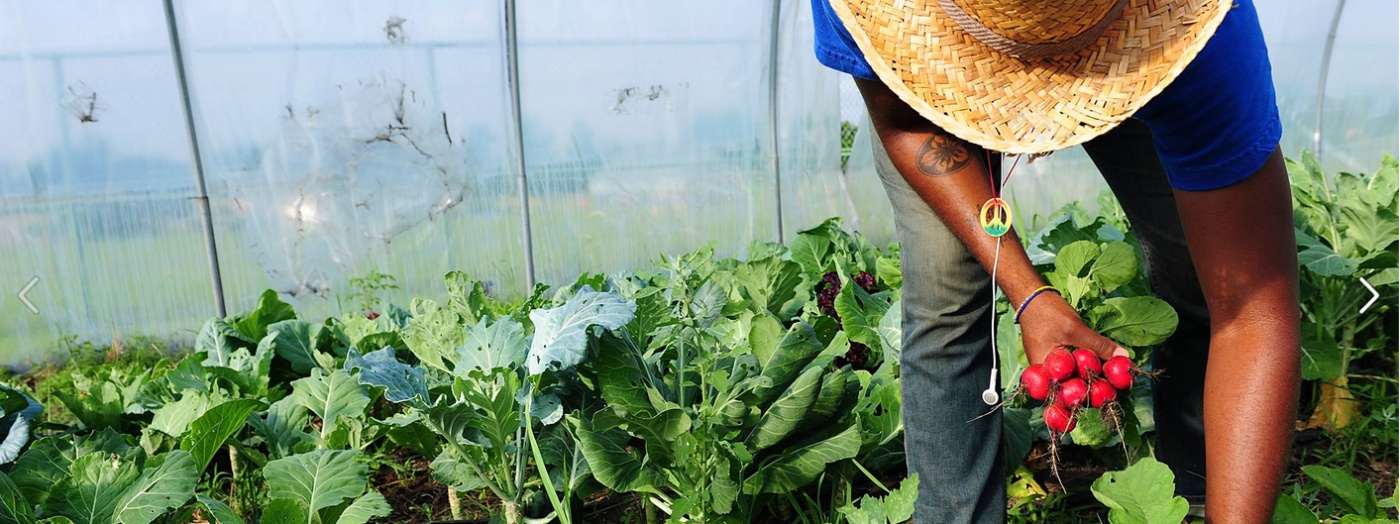History
For more than two decades, RUAF has been a vocal proponent of the imperative for food and agriculture to feature on the urban development agenda. Over this time, it has maintained its position as a leader and innovator, whilst growing and diversifying, adapting and transforming. It has leveraged its original focus on UA to develop a more systemic approach to feeding cities.

RUAF: Rooted in cities
Over 20 years in urban agriculture and urban food systems
The following paragraphs summarise key steps in RUAF’s journey to date.
1999-2004 Building a global network of regional resource centres
The RUAF – Resource Centers on Urban Agriculture and Forestry initiative was launched in 1999, as a major and lasting outcome of the international Support Group on Urban Agriculture convened by IDRC in Ottawa in 1996. Led by ETC Foundation (the Netherlands), its two initial core funders were IDRC and the Dutch Government. Given the 1996 Habitat III Conference’s heightened attention to urban sustainability, RUAF’s funders saw urban agriculture as a new field where they could complement each other, through both supporting multidisciplinary research for actionable results (IDRC), and practical cross-sector interventions (Dutch Government). The founding membership was selected mostly from among IDRC’s UA research grant recipients.
Over the first five years, the RUAF network broadened its focus, from building a network for documentation and sensitisation, to strengthening capacities, and supporting policy and action planning.
2004-2012: The RUAF Foundation
In 2004, the RUAF network became an independent non-governmental organisation for policy innovation on urban agriculture and food security, with its own governing body – the RUAF Foundation – staffed by employees of member organisations subcontracted to the Foundation. The network itself was re-named RUAF Resources Centers on Urban Agriculture and Food Security.
Over this period, RUAF expanded its geographical reach and scale of its activities, particularly through its City Farming for the Future (CFF, covering 20 cities and over 100 local partners) and From Seed to Table (FS2T, 17 cities in 7 world regions) programmes.
- CFF included tailored stakeholder training and innovative policymaking and action planning in diverse contexts. Policy formulation protocols that integrated UA into spatial planning and financing mechanisms mobilised the expertise of the RUAF collective in response to local governments’ expressed needs and following issuance of its Guidelines for Municipal Policymaking.
- FS2T supported urban producer organisations with farming innovations, micro-enterprise and value chain development. The results were captured in RUAF‘s two books Cities Farming for the Future and Cities, Poverty and Food.
After the 2008-9 financial crisis, official development assistance’s engagement with civil society changed, making it more challenging to compete for major grants against large institutions with secure core funding. RUAF saw this as a good time to revisit its niche since organisations engaged in rural agriculture or urban development were now embracing a “food in cities” agenda.
2012-2019: The RUAF Global Partnership
The work of the RUAF Foundation in 2012-13 laid the groundwork for a substantial transformation over the rest of the decade, in particular members assessed their own commitment to the network in light of their changing management and priorities. The Board was restructured and reduced from nine members who appointed a director, to three independent experts. In 2013, the new organisational structure was approved by the RUAF members, as well as a more deliberate approach to recruiting new members and growing the Network.
In 2014, the RUAF Foundation convened a new Board of Trustees to oversee the transition of the Foundation and its network to a new model. The refreshed membership was convened in 2016. The renamed RUAF Global Partnership on Sustainable Urban Agriculture and Food Systems successfully converted its network into a true partnership, with the RUAF Foundation serving as a secretariat. Members are more diverse and bring new expertise to urban food system policy and planning, going beyond UA itself. They also better represent the global reach and multi-sectoral mission of RUAF (with 3 local governments, 3 research organisations and 4 NGOs).
In 2015, RUAF collaborated in the foundation of the Milan Urban Food Policy Pact (MUFPP), with FAO and other partners. Now signed by over 215 cities worldwide, the MUFPP is becoming the most important community of practice for healthier, more equitable and sustainable urban food systems.
The RUAF Global Partnership’s record over this period demonstrates its acquired credibility and position in influencing major conversations on cities’ social, economic and environmental sustainability. For instance:
- with the Climate and Development Knowledge Network, a framework was established to monitor impacts of urban and peri-urban agriculture and forestry on climate change and adaptation (with evidence informing new policies worldwide);
- with ICLEI, interventions were made addressing urban resilience;
- with the Carasso Foundation and FAO, RUAF operationalised the concept of city region food systems, and a methodology to map and assess such systems in selected cities worldwide;
- with the SDC and OXFAM in Gaza, and with WHH, CARE and Coopi in Liberia and Sierra Leone, RUAF has developed short food chains in urban and peri-urban areas;
- with Erasmus-plus and Ryerson University, RUAF established a curriculum for skill development, knowledge exchange and innovation among SMEs, policymakers and HEIs;
- through the DGIS-funded WASH Alliance and IWMI knowledge gained from work with RUAF, business models and pilots for sanitation interventions on different scales (household, schools, public areas, central systems) were developed;
- with the World Bank, metrics to appraise the impact of urban food policies on various development dimensions have been established.
Over the period 2016-2019, RUAF formed a strategic alliance to enhance its impact on urban sustainability.
2019-2023: Hosted by Hivos
In 2019, RUAF’s Secretariat and Board successfully transferred the Secretariat to a larger NGO, HIVOS (Humanist Organization for Social Change), whose values, mission and reach align with those of the RUAF Global Partnership. As such, contracting, maintaining the website and other tasks were handled within a larger organisation that is very active in the Global Partnership’s field of interest. The RUAF Foundation was therefore terminated in 2020.
During this time, on behalf of the RUAF Secretariat Hivos entered into agreements to provide consultancy services on several large projects, including:
- with FAO, the second phase of the City Region Food Systems Programme focusing on resilience to multiple shocks and stressed;
- with CGIAR, the Resilient Cities Initiative.
RUAF also contributed to Hivos’ successful co-development of the Urban Futures programme, with Fondation Botnar.
2023: The establishment of RUAF CIC
The RUAF Secretariat’s early experiences with its new host were reviewed in 2021. Following this review and subsequent recommendations, the mutual decision was taken to establish a new, independent legal entity for RUAF, to function as a consultancy and as Secretariat of the RUAF Global Partnership.
In 2023, RUAF CIC was incorporated in Frome, United Kingdom. RUAF CIC is a non-profit community interest company, the activities of which provide benefit to food systems stakeholders and residents in cities and city regions around the world, especially low income and marginalised groups (including women, youth, migrants, and others) who experience food insecurity, discrimination, lack of economic opportunities, and who are most vulnerable to the impacts of shocks and stresses on food systems.
This history of RUAF is adapted from an account written by Luc Mougeot and Frans Verberne (former Board member), which appeared in Urban Agriculture Magazine 38.

